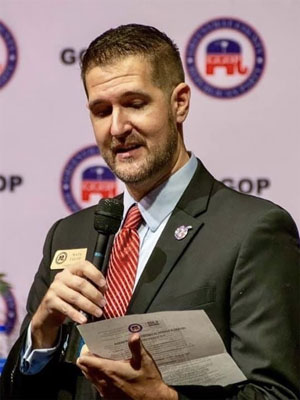
On July 19, 2016, I was proud to cast my vote as one of South Carolina’s 50 delegates to the Republican National Convention, 1 of 4 delegates from Greenville County, and 1 of 2,472 from across America and our territories, to officially make Donald J. Trump our party’s nominee. Since that time, the conversation surrounding many of our candidates and grassroots activists is not who they are or what they stand for, but a fight to prove who is “more Trump.” In attempting to prove who is more Trump, the argument really isn’t which candidate is the most like him in personality or principles but has become simply who supports him the most and when they started supporting him.
In the past few primaries in South Carolina, we have seen this used as a campaign strategy at all levels. U.S. Senator Lindsey Graham would not be considered a “Trump Republican” by friend or foe, but has become a strong ally of President Trump, publicly endorsing him, and receiving his endorsement in return. While Sen. Graham strongly supports many aspects of President Trump’s agenda, his campaign message was not that he was like Trump or he shares an identical agenda, but simply that he supports Trump.
We have even seen this become a predominant topic at the party level. When I ran for re-election for county party chairman in 2019, although I was a strong Trump supporter since mid-2016, my rivals deceptively tried to paint me as a “never-trumper,” unable to understand the definition of “never” and refusing to acknowledge that I spent more time volunteering for Present Trump than most any other person in our county. The support of candidate Donald J. Trump during the 2016 primary became a litmus test with many self-described “MAGA” from that point forward. To this segment, if you didn’t support Donald Trump in the 2016 primary, you can never be a patriot, MAGA, or a true Trump supporter, no matter how strongly you supported him as the nominee or as President.
In Greenville, one man has become an icon of people who believe that only those who supported or endorsed Donald Trump during his 2015-2016 primary are true MAGA. That man is the late Pressley Stutts. While Mr. Stutts gained the following and unwavering loyalty of many “original” Trump supporters, few knew that he actively opposed Donald Trump during the primary and publicly asked primary voters to vote against him.
In a February 11, 2016, social media post, Mr. Stutts shared an article titled “SHAME On Evangelicals! How Can You Choose Trump Over a Man Like Ted Cruz?” where he asked “To all my friends who are supporting Trump…I understand your support, but humbly ask you to consider this article. We all want what’s best for our country.” Mr. Stutts later verified his support of Ted Cruz in a July 21st post where he said he “wholeheartedly and enthusiastically endorsed him.” 13 months later, Mr. Stutts with no comment shared a post saying “’The Trump presidency that we fought for and won is over.’ -Steve Bannon”.
Pressley Stutts went on to become a hero of the “Trump original” and MAGA supporters.
It is important to recall the political climate leading up to the Trump presidency. In Greenville County, Donald Trump received 26.79% (25,044) of the vote. Marco Rubo received 24.65% (23,037). The candidate Pressley Stutts endorsed, Ted Cruz, received 24.63% (23,026). Yet somehow, it seems like most every Republican primary voter, candidate, and elected official wants to claim they were a “Trump original” and expects every Republican candidate to be one.
Not only has the 2016 primary support of Donald Trump by candidates and elected officials become a litmus test but endorsing him has as well. I am favorable to endorsements because they can let voters have an insight into the candidate who is asking for their vote, but in modern-day politics, it is often done for political expediency, not because the candidate is a true supporter. Some voters and even opponents attack candidates for non-endorsements. I would rather have a candidate refrain from endorsing than endorse simply for their political gain, especially when their rhetoric and record does not match the candidate they are endorsing.
Support of Trump in a 2016 primary should not be a litmus test for our candidates or grassroots activists. They should be judged on their principles, platforms, and records. Pressley Stutts showed that a person can support a conservative presidential candidate and oppose Donald Trump during the 2016 Republican Primary but become a strong Trump supporter and leader in the MAGA movement. Voters should support candidates based on who they are and what their principles are, not just on who they have endorsed or not endorsed.












